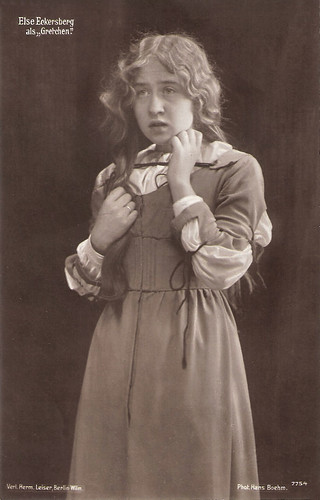
German postcard by Verlag Hermann Leiser, Berlin-Wilm.no. 7754. Photo: Hans Boehm, Berlin. Else Eckersberg as Gretchen in Goethe's 'Faust' (1913).

German postcard byVerlag Hermann Leiser, Berlin-Wilm., no. 9945. Photo: Fritz Richard.
The youngest member of Max Reinhardt's ensemble
Else Eckersberg was born in 1895 in Berlin as the daughter of Paul Eckersberg and Antonie, née Tessel. After the early death of her father, she grew up with her grandparents and in the boarding school of the Ursulines.
In her first marriage, Else Eckersberg married the lawyer Walther Eitzen in 1913. After her divorce in 1918, she married Philipp Freiherr Schey von Koromla in Berlin in 1921, from whom she divorced in 1935. In her third marriage, she married Paul Graf Yorck von Wartenburg in 1940 in Berlin. Her only child was Alexander (1927-2012) from her second marriage, who was adopted by his stepfather in 1950.
After completing her secondary education, Else Eckersberg entered the acting school of the Deutsches Theater under the direction of Max Reinhardt at the age of 15. After two years of training, she was the only girl accepted for further training alongside Gert Fricke, Friedrich Wilhelm Murnau, Ernst Waldow, Ernst Lubitsch and Ernst Hofmann.
In a private performance of Frank Wedekind's 'Tod und Teufel' (Death and the Devil), Else was discovered in 1912 in the role of the strumpet Lisiska and engaged by Max Reinhardt as the youngest member of his ensemble.
On 31 August 1912, she made her debut at the Deutsches Theater as Klugheit in Goethe's 'Faust II'. Under Reinhardt's direction, she also ventured an early foray into silent film, shooting Eine Venezianische Nacht/A Venetian Night (Max Reinhardt, 1914) with Maria Carmi and Alfred Abel.

German postcard by Photochemie, Berlin, no. K. 1631. Photo: Becker & Maass., Berlin.
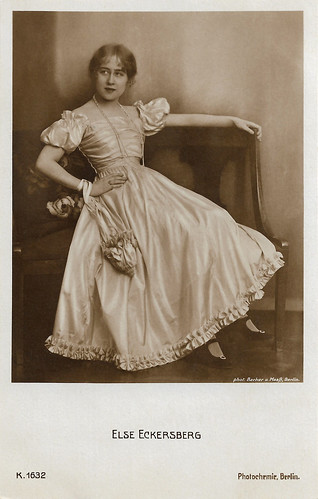
German postcard by Photochemie, Berlin, no. K. 1632. Photo: Becker & Maass, Berlin.

German postcard in the Film Sterne series by Rotophot, no. 109/1. Photo: Becker & Maass, Berlin.
Glamorous, slightly capricious, fun-loving and humorous roles
German Wikipedia downplays Else Eckersberg's film career but she still played in 20 films between 1914 and 1921. In 1914 she started at Union / PAGU, in a range of 9 comedies of 1914-1915 in which she was paired with Ernst Matray, and in which at times also e.g. Anna Müller-Lincke and Senta Söneland performed. These were mostly directed by Richard Löwenbein, e.g. Die Erbtante/The Inherited Aunt (Richard Löwenbein, 1914), Eine Lausbubengeschichte/A lousy boy's story (N.N., 1915), and Die bösen Buben/The bad boys (Richard Löwenbein, 1915).
In 1916 she created her own comedy series at Greenbaum-Film with the character Else, e.g. Elses letzter Hauslehrer/Else's last tutor (Paul Otto, 1917) with Curt Vespermann, Else als Detektiv/Else as a detective (Louis Neher, 1917), and Else und ihr Vetter/Else and her cousin (Louis Neher, 1917) with Wilhelm Diegelmann and Julius Falkenstein. After an absence from the sets, Eckersberg returned in 1920-1921 for three more Else-comedies, now at Althoff & Co., Else, der Räuberbrau/Else, the Robber Bride (Rudi Bach, 1920) with Fritz Kampers, Else, die Tochter der Exzellenz/Else, the daughter of the Excellency (Rudi Bach, 1920) and Prinzesschen Else/Little Princess Else (Rudi Bach, 1921).
Else Eckersberg also played supporting parts in the Fyodor Dostoevsky adaptation Die Brüder Karamasoff/The Brothers Karamazov (Carl Froehlich, Dimitri Buchowetzki, 1920) and Lupu Pick's Der Dummkopf/The Fool (1921) with Max Adalbert. After 1921, Eckersberg worked almost exclusively at the theatre where she shone mainly in glamorous, slightly capricious, fun-loving and humorous roles of women and girls.
After a guest performance in operetta, Else Eckersberg's breakthrough came in 1920 in the role of Cleopatra in G.B. Shaw's play 'Cäsar und Cleopatra' (Caesar and Cleopatra). Numerous engagements at theatres in Berlin and Vienna followed. With Reinhardt's departure from Berlin, Else Eckersberg also left the ensemble of the Deutsches Theater in 1921 and played mainly comedies at various entertainment theatres in the following years.
In 1924 she again enjoyed great success as Dodo in Hopwood's 'Unsere kleine Frau' at Reinhardt's Kammerspiele and as Antoinette Hechingen in Hugo von Hofmannsthal's 'Der Schwierige' at Vienna's Theater in der Josefstadt. In the early 1930s, Eckersberg's roles as Antoinette in Hofmannsthal's 'Der Schwierige', Christina in Bourdet's 'Das schwache Geschlecht' and Amanda in Noel Coward's 'Intimitäten' (Intimacies) earned her acclaim from Berlin theatre critics as a female comedienne of the first rank, a ravishing clown and witty parodist.
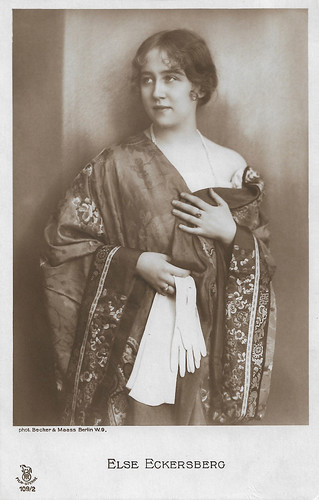
German postcard in the Film Sterne series by Rotophot, no. 109/2. Photo: Becker & Maass, Berlin.
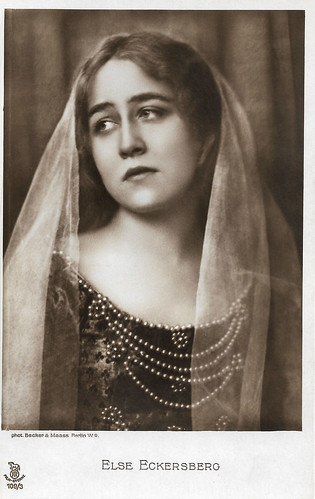
German postcard in the Film Sterne series by Rotophot, no. 109/3. Photo: Becker & Maass, Berlin.

German postcard in the Film Sterne series by Rotophot, no. 109/4. Photo: Becker & Maass, Berlin.
Arrested and kept in solitary confinement for two months
In 1932, Else Eckersberg starred alongside Hans Brausewetter in her self-written play 'Three Years and a Night', which was staged by Eugen Robert, the director of the Berlin Tribüne under the title 'Stichwort Feldena'.
After the National Socialists seized power, Else Eckersberg withdrew more and more from the stage. The actually apolitical actress suffered from the fate of her Jewish colleagues and friends. In 1934 she played Noel Coward's 'Intimacies' again under Otto Falckenberg at the Munich Kammerspiele, in 1935 under Heinz Hilpert in Hauptmann's 'Griselda' and under Gustaf Gründgens, she played the Queen in Scribe's 'Das Glas Wasser'(The Glass of Water).
Else Eckersberg appeared the last time in front of the camera in Der Florentiner Hut/The Leghorn Hat (Wolfgang Liebeneiner, 1939) starring Heinz Rühmann. On the occasion of Gerhart Hauptmann's 80th birthday, Eckersberg, a close friend of the poet, recited 'Hannele's Ascension' for the first time. She performed this play several times after the Second World War and showed all her acting skills in the nuanced portrayal of the various characters.
In 1944, Else Eckersberg was arrested as the sister-in-law of Peter Graf Yorck von Wartenburg, who took part in the assassination attempt of 20 July and was kept in solitary confinement for two months. In 1958, Else Eckersberg published her memoirs under the title 'Diese volle Zeit' (This Full Time), in which she once again illuminated the lost glory of the era of Berlin theatre before the Second World War.
In the following years, Else Eckersberg lived in Lyon and Bucharest due to her husband's diplomatic activities and after his retirement in Neureichenau, where she died in 1989. She was buried in Jagsthausen in the tomb of the Barons of Berlichingen, ancestors of her husband on his mother's side.
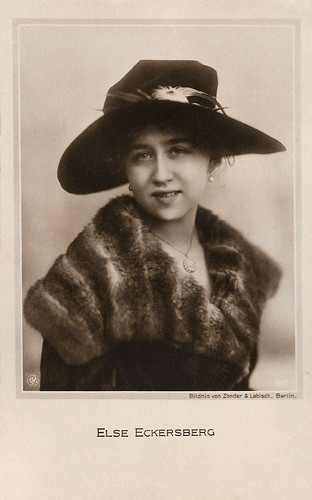
German postcard by NPG, no. 941. Photo: Zander & Labisch, Berlin.

German postcard by Verlag Hermann Leiser, Berlin-Wilm., no. 3008. Photo: Nicola Perscheid. Else Eckersberg as countess Liszka and Johannes Riemann in the play 'Fasching' (Farsang; Fashions for Men) by Ferenc Molnar, directed by Max Reinhardt at the Deutsches Theater in 1917. Sent by mail in 1917.
Sources: Wikipedia (German), and IMDb.
No comments:
Post a Comment